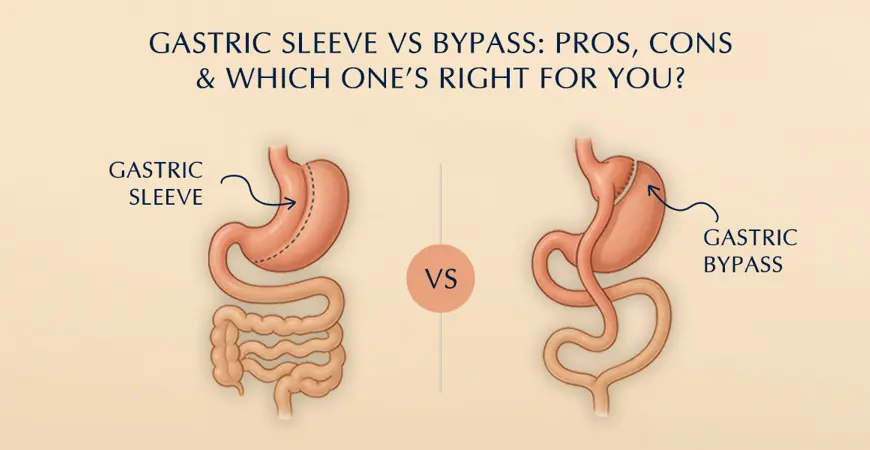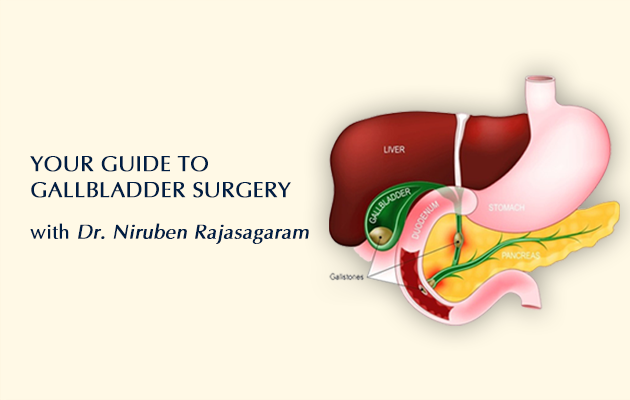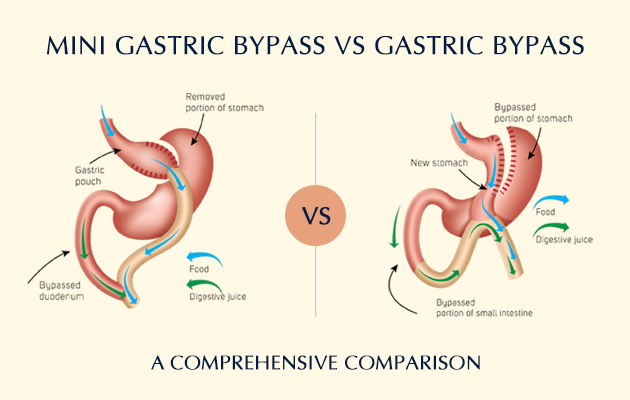When considering weight loss surgery, two of the most commonly discussed options are the gastric sleeve and gastric bypass. Both procedures can lead to significant weight loss, but each has its distinct characteristics. Understanding the difference between gastric sleeve and bypass is important in making an informed decision.
In this blog, Dr. Niruben, an experienced surgeon, will provide a comprehensive overview of the different weight loss surgeries, offering insights to help you determine which option is right for your individual needs.
Understanding the Gastric Sleeve and Gastric Bypass
Before we explore the specifics of gastric sleeve vs gastric bypass, let’s understand the basics of each procedure:
-
Gastric Sleeve: This procedure, also known as sleeve gastrectomy, involves removing a large portion of the stomach, leaving a smaller "sleeve" or tube-shaped stomach. This significantly reduces the stomach’s size, limiting the amount of food it can hold, and thus helping you feel full faster.
-
Gastric Bypass: Gastric bypass, or Roux-en-Y gastric bypass, is a more complex procedure where the stomach is divided into a small upper pouch and a larger lower pouch. The small pouch is then connected directly to the small intestine, bypassing a portion of the stomach and the first part of the small intestine. This not only limits food intake but also reduces nutrient absorption.
Pros and Cons of Gastric Sleeve Surgery
Gastric sleeve surgery is a popular choice for individuals seeking significant weight loss with a less invasive procedure. However, like any surgery, it has its advantages and disadvantages:
Pros of Gastric Sleeve
Here are some pros of gastric sleeve surgery in Melbourne:
-
Simpler Procedure: Gastric sleeve surgery is generally quicker and less complicated than gastric bypass, requiring less time in the operating room.
-
Fewer Nutritional Deficiencies: Since the procedure doesn't alter the intestine's absorption process, there are fewer risks of long-term nutrient deficiencies compared to gastric bypass.
-
Permanent Weight Loss: Many patients experience significant weight loss in the first year after surgery and continue to maintain it with proper lifestyle changes.
-
No Foreign Objects: Unlike gastric bypass, which may involve the use of medical devices like bypassed sections or stents, the gastric sleeve does not require foreign objects to aid in weight loss.
Cons of Gastric Sleeve
Here are some cons of gastric sleeve surgery:
-
Irreversible: The removal of a portion of the stomach is permanent, so the procedure cannot be undone.
-
Potential for Gastroesophageal Reflux Disease (GERD): Some patients experience heartburn or acid reflux after the surgery, which could require additional treatments.
-
Slower Weight Loss in the Long Term: While the initial weight loss can be fast, it tends to slow down over time compared to gastric bypass.
Pros and Cons of Gastric Bypass Surgery
Gastric bypass is a more involved procedure with a higher complexity. While it can offer faster results, it comes with both notable advantages and challenges:
Pros of Gastric Bypass
Here are some pros of the gastric bypass surgery:
-
Faster Weight Loss: Gastric bypass generally leads to faster and more dramatic weight loss than the gastric sleeve due to the combination of restricted food intake and nutrient malabsorption.
-
Improvement in Comorbid Conditions: Many patients experience significant improvement or even resolution of conditions like Type 2 diabetes, high blood pressure, and sleep apnea after gastric bypass.
-
More Significant Long-Term Weight Loss: Due to the bypass of part of the small intestine, patients generally maintain greater weight loss over the years.
Cons of Gastric Bypass
Here are some cons of gastric bypass surgery:
-
Higher Risk of Nutrient Deficiencies: Because part of the digestive system is bypassed, gastric bypass patients are at higher risk of deficiencies in essential vitamins and minerals such as Vitamin B12, iron, and calcium. Regular supplementation is required.
-
More Complex Surgery: Gastric bypass is a more intricate surgery, involving longer recovery times and a greater risk of complications, including leakage, blood clots, and infection.
-
Requires Lifestyle Modifications: Due to the bypassed stomach and intestines, patients must adhere to a stricter eating plan to avoid complications such as dumping syndrome, which occurs when food moves too quickly through the digestive system.
Which Weight Loss Surgery Is Best for You?
Choosing between the gastric sleeve and the gastric bypass depends on a variety of factors, including your health history, weight loss goals, and lifestyle considerations. Below are a few key points to help you decide:
Gastric Sleeve might be right for you if:
-
You want a less invasive surgery with a shorter recovery time.
-
You are looking for a procedure with fewer nutritional concerns over the long term.
-
You’re looking for a permanent solution, but you can handle slower, steady weight loss.
Gastric Bypass might be better if:
-
You want faster weight loss and greater initial results.
-
You have obesity-related conditions, such as diabetes, sleep apnea, or high blood pressure, that you hope to improve or resolve.
-
You are prepared to take supplements and adhere to a strict diet post-surgery.
Ultimately, consulting with a healthcare provider is important in determining the right procedure. Dr. Niruben Rajasagaram’s experience and skills in bariatric surgery can help you understand the difference between the two procedures and recommend the best approach based on your health and needs.
Key Differences Between Gastric Sleeve and Gastric Bypass
To make a clear comparison, here’s a quick table outlining the key differences between the gastric sleeve vs gastric bypass:
|
Feature |
Gastric Sleeve |
Gastric Bypass |
|
Procedure Complexity |
Less complex, quicker procedure |
More complex with longer recovery |
|
Weight Loss Speed |
Slower initial weight loss |
Faster and more dramatic weight loss |
|
Long-Term Weight Loss |
Steady but slower weight loss |
More significant long-term weight loss |
|
Risk of Nutrient Deficiency |
Lower risk |
Higher risk of deficiencies (B12, iron) |
|
Irreversibility |
Permanent removal of the stomach portion |
Can be reversed in some cases |
|
Effect on Comorbid Conditions |
Can improve some conditions |
Significant improvement in conditions like Type 2 diabetes |
Consult Dr. Niruben Rajasagaram for Personalised Guidance
Choosing between gastric sleeve and gastric bypass surgery and determining which weight loss surgery is best for you depends on your individual health goals and medical history. Both procedures are effective weight loss solutions, each with distinct advantages and risks. Dr. Niruben Rajasagaram offers expert guidance to help you navigate this important decision, providing personalised advice tailored to your needs.
With extensive experience in weight loss surgeries, Dr. Rajasagaram ensures a patient-centred approach, helping you make informed decisions. His commitment to delivering successful outcomes is reflected in over 100+ verified reviews on Doctify, showcasing his dedication to quality care and patient satisfaction. When you choose Dr. Rajasagaram, you're opting for an experienced professional with a proven track record of safely helping patients achieve their weight loss goals.
Visit our weight loss centre for a consultation with Dr. Niruben to discuss your preferences and learn about the ideal weight loss surgery option for you.








